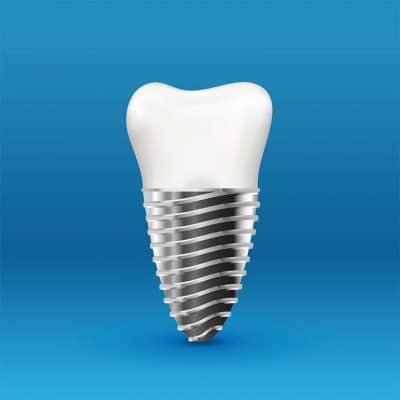We know that dental implants can last a very long time. However, they do fail. In our previous blog on this subject, we focused on the role of gum disease in triggering implant failure. Basically, if bacteria infect the area around the implant, the bone can be damaged, causing the implant to loosen and come out. Incidentally, a larger, longer study done since the three studies we cited showed a dental implant survival rate of 93% at 17 years.
But what about the implant itself? How well do these hold up to the constant strain of biting and chewing? A brand new study focused on the long-term durability of dental implants, and the answer is that implants seem to hold up really well, despite the constant demands of the mouth on the implant structure.
Implants for Veterans
 This study was conducted by researchers at the Dental Hospital of Veterans Health Service Medical Center in Seoul, Korea. It focused on just over 19,000 implants given to a total of 5124 patients from 2006 to 2018. Follow-up ranged from 0.03 to 12.39 years.
This study was conducted by researchers at the Dental Hospital of Veterans Health Service Medical Center in Seoul, Korea. It focused on just over 19,000 implants given to a total of 5124 patients from 2006 to 2018. Follow-up ranged from 0.03 to 12.39 years.
In this study, 174 implants in 135 patients fractured, a failure rate of 0.92% after an average of about five years. Researchers calculated expected survival rates for the implants of 99.8%, 99.2%, and 97.7% at 3, 5, and 10 years.
They then used multivariable regression to figure out which factors might be linked to increased failure rates and which might be linked to increased survival rates.
They found that several factors could cause the balance to sway one way or the other. Factors that were linked to a lower risk of fracture were having a wider diameter implant, and having implants placed in the front of the lower arch (mandible).
Factors that were linked to increased fracture risk included implants placed with a bone graft and the presence of microthreads.
How Does This Compare to Other Fracture Rate Studies?
Since this is not the first study to look at dental implant fracture, it’s worth it to compare this study with previous results. In particular, we want to look at the very large 20-year implant study we cited earlier. In that study, they documented 30 mechanical complications, which included implant fractures, accounting for about 0.2% (two out of every thousand) implants. This was one of the least likely cause of implant failure. However, it was the only cause of implant failure that actually increased over time, becoming more likely after five years than before.
Dental Implants Are Very Successful
Overall, this new study serves to confirm what we already knew: dental implants are very durable. They have a very high long-term success rate. And although some factors may influence a dental implant’s tendency to survive or fracture, the overall odds of this happening are quite small all around.
This is one of the things that makes dental implants a great investment: their longevity. When you invest in dental implants, you are investing not in something that will last a few years–you are investing in something that can last you a lifetime.
If you would like to learn more about the benefits of dental implants in the Hilton Head area, please call (843) 706-2999 today for an appointment with an implant dentist at Durham.




